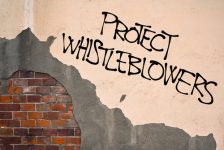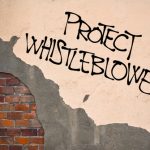Australian Whistleblowers are Persecuted Rather than Praised

Chelsea Manning was released from US military prison last week, after serving seven years of a 35 year prison sentence for espionage convictions relating to the classified documents she disclosed to WikiLeaks. Former US president Barack Obama commuted her sentence on his last day in office.
One of the world’s most famous whistleblowers, Ms Manning leaked more than 700,000 classified Iraq and Afghanistan war logs and diplomatic cables in 2010. She also leaked a video of a US helicopter crew killing at least nine men, including two Iraqi journalists, who worked for Reuters news agency.
In recent decades, Australia has had its fair share of whistleblowers as well. Independent MP Andrew Wilkie blew the whistle on the government’s flawed intelligence case for the 2003 Iraqi war.
He made it known that our government was well-aware that Iraq did not have weapons of mass destruction and posed little threat to the west, yet sent our troops to fight in Iraq based on that claim.
In August 2015, a 7-Eleven employee spoke out about the systemic wage fraud that the convenience store giant was carrying out. The whistleblower exposed a system where employees were regularly paid half the award rate, and were threatened with deportation if they complained.
Alleged police whistleblower Rick Flori has been pursued by the Queensland Police Service for years. The former police sergeant with 25 years of service was suspended and charged with misconduct in public office – an offence which carries a maximum penalty of 7 years’ imprisonment – for allegedly leaking footage of several of his fellow officers bashing a man in the police station car park in 2012. While the brave former officer has vowed to fight till the very end, several years of prosecution has taken a heavy toll on him and his family.
Brian Hood exposed that bribes were being paid by Reserve Bank subsidiaries, Note Printing Australia (NPA) and Securency in 2007. The former company secretary of NPA, Mr Hood was subsequently made redundant after revealing the kickback operation to senior management.
The harsh payment for speaking out
Mr Hood’s story is common when it comes to whistleblowers in this country. The whistleblowing system requires individuals to initially report allegations internally. This often leads to management concealing corrupt practices, and devise strategies to get rid of the employee who’s spoken out.
The 7-Eleven whistleblower said that “internal whistleblowing systems are generally a first line of defence for a company to filter out snitches.” Former whistleblowers consistently express the need for greater protections for those who expose corruption.
Other common negative outcomes for those who speak out are threats by work colleagues, demotion and loss of work. Brian Hood found this out after he blew the whistle.
A flawed system
Jeff Morris’ family left him after he spoke out. The Commonwealth Bank financial planning whistleblower initially sent an anonymous fax to the Australian Security and Investments Commission (ASIC) about the fraud he was exposing. But it wasn’t until he fronted up in person that ASIC made a move on his claims.
ASIC is Australia’s corporate, markets and financial services regulator. The commission’s website provides guidelines for whistleblowers in the corporate sector.
It says that a whistleblower must be a current employee of the company they’re exposing. They must provide the information to management, an authorised personnel member, or to ASIC itself. An informant cannot be anonymous, despite the consequences. They must establish reasonable grounds for suspecting the alleged conduct, and their disclosure must be made in “good faith”.
There is little doubt that the requirement to disclose identity and have reasonable grounds act as a deterrent to employees coming forward, while the requirement to be a current employee ensures former workers cannot blow the whistle – even if they were dismissed after threatening to expose the truth.
The Corporations Act 2001 governs corporate whistleblowing in this country. The law provides that information leaked by a whistleblower is a “protected disclosure.” It also protects the individual who speaks out from civil or criminal litigation, and guards against victimisation.
However, many who come forward find that the system actually discourages people from speaking out. And when they do take that step, it creates considerable stress in their lives.
The parliamentary inquiry
A parliamentary inquiry into whistleblower protection in the corporate, public and not-for-profits sectors is currently underway. Submissions closed last month, and the Joint Parliamentary Committee on Corporations and Financial Services has conducted public hearings in Queensland, Victoria and the ACT.
Whistleblowers Australia president Cynthia Kardell outlined in her organisation’s submission to the inquiry that instead of internal disclosure being the first step for a whistleblower, the legislation should be amended so they have the option of approaching the media, politicians or another third party from the outset.
She argues the law and internal policies should protect and encourage, or even reward, people who come forward.
Ms Kardell recommends that a public interest disclosure agency (PIDA) be established “to publicly promote, protect and support whistleblowers and whistleblowing across all sectors.” The body could “seek injunctive relief for whistleblowers, prosecute claims of reprisal” and penalise management for failing to support whistleblowers.
She also suggests that a false claims division be set up within the PIDA to register and monitor fraudulent claims, and resolve claims for compensation under false circumstances.
Supporting those who speak out
Whistleblowers Australia was founded back in 1991. They’re a voluntary organisation supporting and mentoring individuals who are willing to speak out about corruption. They also campaign for legislative reform of whistleblowing laws.
They’re the “oldest support group internationally and unique in what” they do, says Mr Kardell. According to her, all jurisdictions in Australia have “provided legislative protections in the form of legal defence, but they’ve been a failure,” as they don’t apply until after an individual has spoken out.
A 2016 Senate Economics Reference Committee whistleblowing report outlined that while Australia had “some of the most robust public sector whistleblower laws in the OECD,” private sector laws lag behind other countries.
Push them until they crumble
Ms Kardell told Sydney Criminal Lawyers® that those in charge of businesses are well versed in how to deal with employees who blow the whistle on corrupt practices. She said that employers realise a whistleblower will “keep on trying to progress the issue,” and so employers keep the pressure on them.
This leads to a situation where a whistleblower becomes “open to accusations of being a crank, irrational, even deranged,” she explained.
“Sustained pressure” is the tactic that management uses in corporate settings when dealing with whistleblowers, who they realise will “eventually wilt.” And this will provide “the trigger for termination,” Kardell stated.
They just spend “all their energy into crafting a different story,” as to why the individual had to leave the company, she added.
Further reforms on the horizon
The parliamentary inquiry will be tabling its report on June 30.
It is hoped that its recommendations will lead to protections that will guard against management cover-ups and bullying, as well as a process that provides different avenues for individuals to divulge corrupt practices.
This could then lead to a situation where corporations are no longer able to manipulate and fabricate the facts surrounding allegations in an attempt, as Ms Kardell puts it, “to bury the alleged wrongdoing along with the whistleblower to avoid losing control and reputational blowback.”








